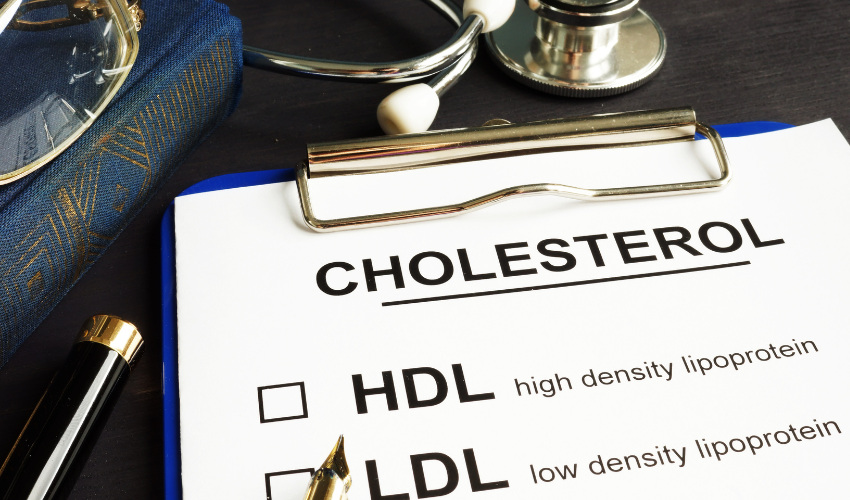Cholesterol is a fatty substance that is produced by the liver and is essential for the proper functioning of the body. It is a vital component of cell membranes, hormones, and helps in the production of Vitamin D. However, when the level of cholesterol in the blood becomes too high, it can lead to serious health problems such as heart disease, stroke, and diabetes.
In this article, we will discuss the importance of maintaining a normal cholesterol level and ways to achieve it.
What is Cholesterol?

Cholesterol is a type of fat that is present in the blood. It is essential for the proper functioning of the body, but when its level becomes too high, it can lead to serious health problems.
Types of Cholesterol
There are two types of cholesterol – LDL (low-density lipoprotein) and HDL (high-density lipoprotein). LDL cholesterol is often referred to as “bad” cholesterol as it can cause plaque buildup in the arteries, leading to heart disease. On the other hand, HDL cholesterol is known as “good” cholesterol as it helps to remove LDL cholesterol from the bloodstream.
What is a Normal Cholesterol Level?

A normal cholesterol level varies depending on age, sex, and other factors. The following are the recommended cholesterol levels:
- Total Cholesterol: Less than 200 mg/dL
- LDL Cholesterol: Less than 100 mg/dL
- HDL Cholesterol: Greater than 40 mg/dL for men and greater than 50 mg/dL for women
- Triglycerides: Less than 150 mg/dL
What are the Risks of High Cholesterol?

High cholesterol can lead to serious health problems such as heart disease, stroke, and diabetes. It can cause plaque buildup in the arteries, leading to narrowing of the arteries and reduced blood flow to the heart and brain.
How to Maintain a Normal Cholesterol Level?
There are several ways to maintain a normal cholesterol level:
- Eat a healthy diet: A diet rich in fruits, vegetables, whole grains, and lean protein can help to lower cholesterol levels.
- Exercise regularly: Regular exercise can help to increase HDL cholesterol levels and decrease LDL cholesterol levels.
- Maintain a healthy weight: Being overweight or obese can increase cholesterol levels.
- Quit smoking: Smoking can lower HDL cholesterol levels and increase the risk of heart disease.
- Take medications: In some cases, medications such as statins may be prescribed to lower cholesterol levels.
FAQs
Can cholesterol be lowered without medication?
Yes, a healthy lifestyle that includes a healthy diet, regular exercise, and maintaining a healthy weight can help to lower cholesterol levels.
Can high cholesterol be genetic?
Yes, high cholesterol can be inherited from family members.
Can cholesterol be too low?
Yes, low levels of cholesterol can increase the risk of certain health problems such as depression, anxiety, and bleeding disorders.
Can stress affect cholesterol levels?
Yes, stress can increase LDL cholesterol levels and decrease HDL cholesterol levels.
How often should I get my cholesterol levels checked?
It is recommended to get cholesterol levels checked every 4-6 years for adults over the age of 20.
Conclusion:
Maintaining a normal cholesterol level is essential for good health. Regular checkups with a healthcare provider can help to monitor cholesterol levels and identify any potential problems early on. By taking control of our cholesterol levels, we can take a proactive approach to our health and reduce our risk of serious health complications. So, make sure to prioritize maintaining a healthy cholesterol level for a healthy and happy life.
In conclusion, the importance of maintaining a normal cholesterol level cannot be overstated. High cholesterol can lead to serious health problems, but it can be prevented or managed through simple lifestyle changes and, in some cases, medication. By eating a healthy diet, exercising regularly, maintaining a healthy weight, and avoiding smoking, we can keep our cholesterol levels in check and reduce our risk of heart disease, stroke, and other health problems.
If you have concerns about your cholesterol level, it’s always best to speak to your healthcare provider, who can provide guidance on how to manage your cholesterol and reduce your risk of serious health complications. Remember, taking care of your cholesterol level is an essential part of maintaining good overall health and well-being.






















